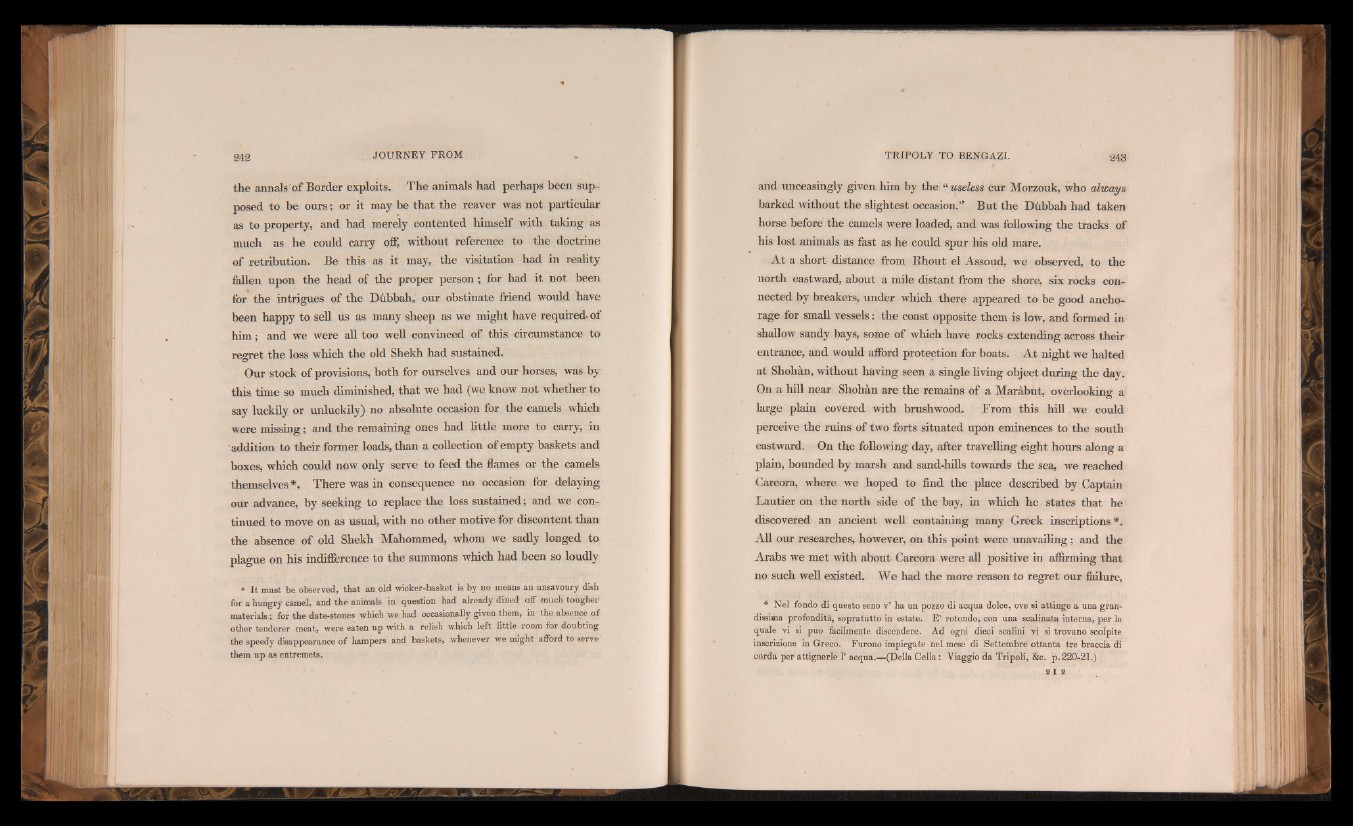
the annals of Border exploits. The animals had perhaps been supposed
to be ours; or it may be that the reaver was not particular
as to property, and had merely contented himself with taking as
much as he could carry off, without reference to the doctrine
of retribution. Be this as it may, the visitation had in reality
fallen upon the head of the proper person; for had it not been
for the intrigues of the Dhbbah, our obstinate friend would have
been happy to sell us as many sheep as w;e might have required, of
him; and we were all too well convinced of this circumstance to
regret the loss which the old Shekh had sustained.
Our stock of provisions, both for ourselves and our horses, was by
this time so much diminished, that we had (we know not whether to
say luckily or unluckily) no absolute occasion for the camels which
were missing; and the remaining ones had little more to carry, in
addition to their former loads, than a collection of empty baskets and
boxes, which could now only serve to feed the flames or the camels
themselves*. There was in consequence no occasion for delaying
our advance, by seeking to replace the loss sustained; and we continued
to move on as usual, with no other motive for discontent than
the absence of old Shekh Mahommed, whom we sadly longed to
plague on his indifference to the summons which had been so loudly
* It must be observed, that an old wicker-basket is by no means an unsavoury dish
for a huiigry camel, and the animals in question had already dined off much tougher
materials ; for the date-stones which we had occasionally given them, in the absence of
other tenderer meat, were eaten up with a relish which left little room for doubting
the speedy disappearance of hampers and baskets, whenever we might afford to serve
them up as entremets.
and unceasingly given him by the “useless cur Morzouk, who always
barked without the slightest occasion.” But the Dùbbah had taken
horse before the camels were loaded, and was following the tracks of
his lost animals as fast as he could spur his old mare.
At a short distance from Ehout el Assoud, we observed, to the
north eastward, about a mile distant from the shore, six rocks connected
by breakers, under which there appeared to be good anchorage
for small vessels : the coast apposite them is low, and formed in
shallow sandy bays, some of which have rocks extending across their
entrance, and would afford protection for boats. At night we halted
at Shohàn, without having seen a single living object during the day.
On a hill near Shohàn are the remains of a Maràbut, overlooking a
large plain covered with brushwood. From this hill we could
perceive the ruins of two forts situated upon eminences to the south
eastward. On the following day, after travelling eight hours along a
plain, bounded by marsh and sand-hills towards the sea, we reached
Carcora, where we hoped to find the place described by Captain
Lautier on the north side of the bay, in which he states that he
discovered an ancient well containing many Greek inscriptions*.
All our researches, however, on this point were unavailing ; and the
Arabs we met with about Carcora were all positive in affirming that
no such well existed. We had the more reason to regret our failure,
* Nel fondo di questo seno v’ ha un pozzo di acqua dolce, ove si attinge a una grandissima
profondità, sopratutto in estate. E' rotondo, con una scalinata interna, per la
quale vi si può facilmente discendere. Ad ogni dieci scalini vi si trovano scolpite
inscrizione in Greco. Furono impiegate nel mese di Settembre ottanta tre braccia di
corda per attignerle ? acqua.—(Della Cella : Viaggio da Tripoli, &c. p. 220-21.)